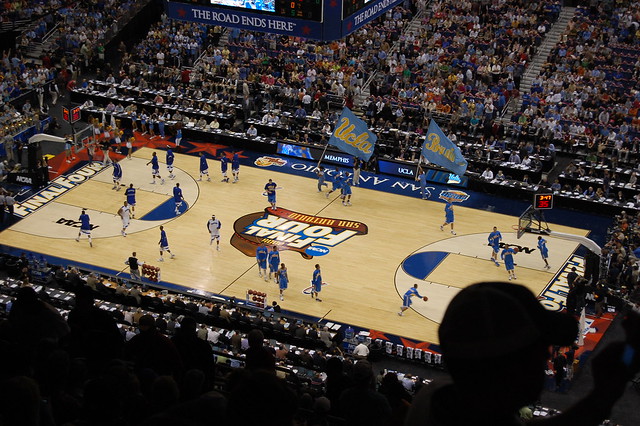
This March’s TV ratings for the NCAA Men’s Basketball Tournament mark a four-year high, placing 2019 in a tie for the third-largest March Madness viewership since the early 1990s. Considering that 2017’s title game drew 23 million viewers, last night’s championship is positioned to exceed that number. High-visibility sporting events like the Final Four not only influence our perceptions of race and sport in a number of ways, but they can also alter the power dynamic between players and owners. In an interview for Match Volume, Sociologist Ben Carrington explains how.
Fans may look forward to high visibility events like the Final Four to escape the pressures of day-to-day life, but sports can have real-world impacts. For example, entertainment sports skew the perception of racial representation within sport, leading fans to believe that Black athletes have more success than they really do.
“All sports are racialized to different degree. Looking at all levels, coaches, owners, GMs, the front office, the media, then most sports remain overwhelmingly white. One of the ancient things, one of the discourses, is that quote ‘Blacks dominate sports.’ …[but] if you look at participation figures–the group who participates most often in the greatest range of sports, most frequently, are white middle class males. They play lacrosse, they ski, they sail, they play, you know, softball, baseball, golf, tennis–across the board. So what we find in a small number of sports, entertainment sports, the ones that have high visibility, there’s a disproportionate number of blacks, black men in particular. So that kind of skews the discussion.”
On the other hand, the sport-as-entertainment industry’s dependence upon Black athletes gives them tremendous power, which NBA players have capitalized on. NFL owners’ fear that players would harness this power likely prompted their backlash against Colin Kaepernick, Carrington explains.
“I don’t actually think the NFL owners were that bothered by Kaepernick speaking out on those issues [like Black Lives Matter]. I think what they became the most fearful about as the protests continued, which helps to explain his exclusion, was that the NFL players would begin to act like NBA players. And by that I mean…[owner] Donald Sterling was effectively stripped of ownership [of the LA Clippers] within 48 hours of that tape breaking. 48 hours. An owner, stripped of ownership. And that came about not because the other owners thought this is really outrageous, that one of us is speaking badly about black people, it came about because Stef Curry and Lebron James made it really clear to the commissioner that you might not have games come Wednesday.”
Given that hot-button issues like these are topics that frequently come up when Carrington teaches “Race, Celebrity, & Sports” and “Politics of Sports” at the University of Southern California, he emphasizes to his students that thinking sociologically — not adopting his political point of view — is the key to getting a good grade.
“What I want the students to do is to think critically. I want them to debunk,… to look to unveil the… power structures which often aren’t visible, but are there, shaping…. Why do we support a certain team rather than another team? Why is there a stadium being built in Englewood? What’s the politics behind that, what’s are the consequences for gentrification, for housing costs, what are the transportation implications of that? Why is the LA Dodgers Stadium where it is? Who gets displaced when stadiums are built where they are? Who gets to own teams? Who gets to play for teams? You know, all of the myriad of things that surround sports: the good and the bad, the ugly and the beautiful.”
Carrington’s goal is to encourage his students to think independently, marshal critical thinking, and use good evidence and data to support their opinions, no matter what side they’re on. For the rest of us, high-profile sporting events like the NCAA Championships invite us all to reflect on the social patterns that shape them.

Comments 3
Harry Fields — April 22, 2022
Hello. I tried to bet on basketball and it didn't work. I lost a lot of money. Can anyone suggest other ways to have fun?
Kyle Farrell — April 22, 2022
Of course, buddy! I'm also used to love bets on basketball, but now I like other games. Do you hear anything 'bout crypto-games? Believe me, what I want to advise you will guarantee you an exciting adventure. What could be better than cryptocurrency games? You don't need any special trading knowledge to start earning cryptocurrency today. All you need is to go through a simple registration on this site https://tower.bet/hi-lo and start playing an exciting cryptocurrency card game. You'll be provided with pleasure and earnings.
Terry E. West — October 20, 2023
The NCAA Men's Basketball Tournament is an annual basketball competition involving university and college teams from the United States. The tournament takes place in the spring and consists of a series of matches to determine the national champion among colleges and universities. This tournament is highly popular in the United States and is considered one of the biggest sporting events of the year, attracting the attention of millions of basketball fans. I really love it.